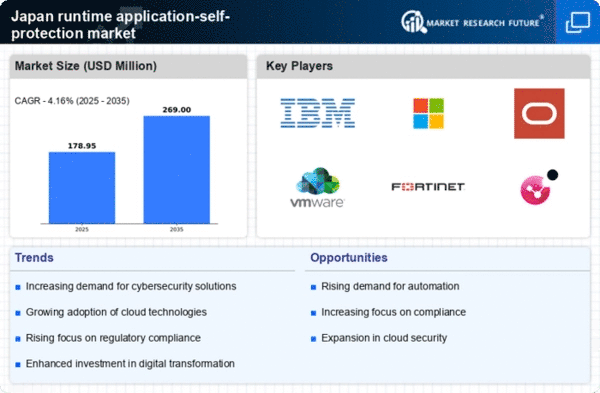Growing Regulatory Pressures
Japan's regulatory environment is becoming increasingly stringent, particularly concerning data protection and privacy. The runtime application-self-protection market is poised to benefit from these developments, as organizations must comply with laws such as the Act on the Protection of Personal Information (APPI). In 2025, it is anticipated that compliance costs for businesses could rise by 30%, prompting them to invest in solutions that ensure adherence to regulations. By implementing runtime application-self-protection market technologies, companies can not only mitigate risks associated with non-compliance but also enhance their overall security posture. This growing emphasis on regulatory compliance is likely to drive demand for advanced security solutions that can provide real-time protection and monitoring.
Rising Cybersecurity Threats
The increasing frequency and sophistication of cyberattacks in Japan has heightened the demand for robust security measures. Organizations are increasingly recognizing the necessity of implementing runtime application-self-protection market solutions to safeguard sensitive data and applications. In 2025, it is estimated that cybercrime could cost the Japanese economy over $1 trillion, prompting businesses to invest in advanced security technologies. The runtime application-self-protection market is positioned to benefit from this trend, as it offers real-time protection against threats, thereby reducing potential financial losses and reputational damage. As companies strive to maintain customer trust and comply with stringent regulations, the adoption of these protective measures is likely to accelerate, driving growth in the runtime application-self-protection market.
Emergence of IoT and Connected Devices
The proliferation of Internet of Things (IoT) devices in Japan is creating new security challenges that necessitate advanced protective measures. The runtime application-self-protection market is likely to see increased demand as organizations seek to secure their applications against vulnerabilities associated with connected devices. In 2025, it is projected that the number of IoT devices in Japan will exceed 1 billion, significantly expanding the attack surface for cyber threats. As businesses integrate these devices into their operations, the need for runtime application-self-protection solutions that can provide real-time monitoring and threat detection becomes critical. This trend indicates a growing recognition of the importance of securing applications in an increasingly interconnected world.
Shift Towards Agile Development Practices
The adoption of agile development methodologies in Japan is transforming how software is developed and deployed. This shift necessitates the integration of security measures throughout the development lifecycle, leading to increased interest in the runtime application-self-protection market. As organizations prioritize speed and flexibility, they are also recognizing the importance of embedding security into their applications from the outset. In 2025, it is expected that over 60% of software development teams in Japan will adopt DevSecOps practices, which emphasize security as a shared responsibility. This trend is likely to drive the demand for runtime application-self-protection solutions that can provide continuous protection and monitoring, ensuring that applications remain secure even as they evolve.
Increased Adoption of Digital Transformation
As Japanese enterprises continue to embrace digital transformation, the need for enhanced security measures becomes paramount. The runtime application-self-protection market is experiencing growth as organizations seek to protect their applications from vulnerabilities that may arise during the digitalization process. In 2025, it is projected that over 70% of Japanese companies will have adopted cloud-based services, which often introduce new security challenges. Consequently, the runtime application-self-protection market is likely to see increased demand as businesses look for solutions that can seamlessly integrate with their digital infrastructure while providing comprehensive protection. This trend indicates a shift towards proactive security measures that can adapt to evolving threats in a rapidly changing technological landscape.
















